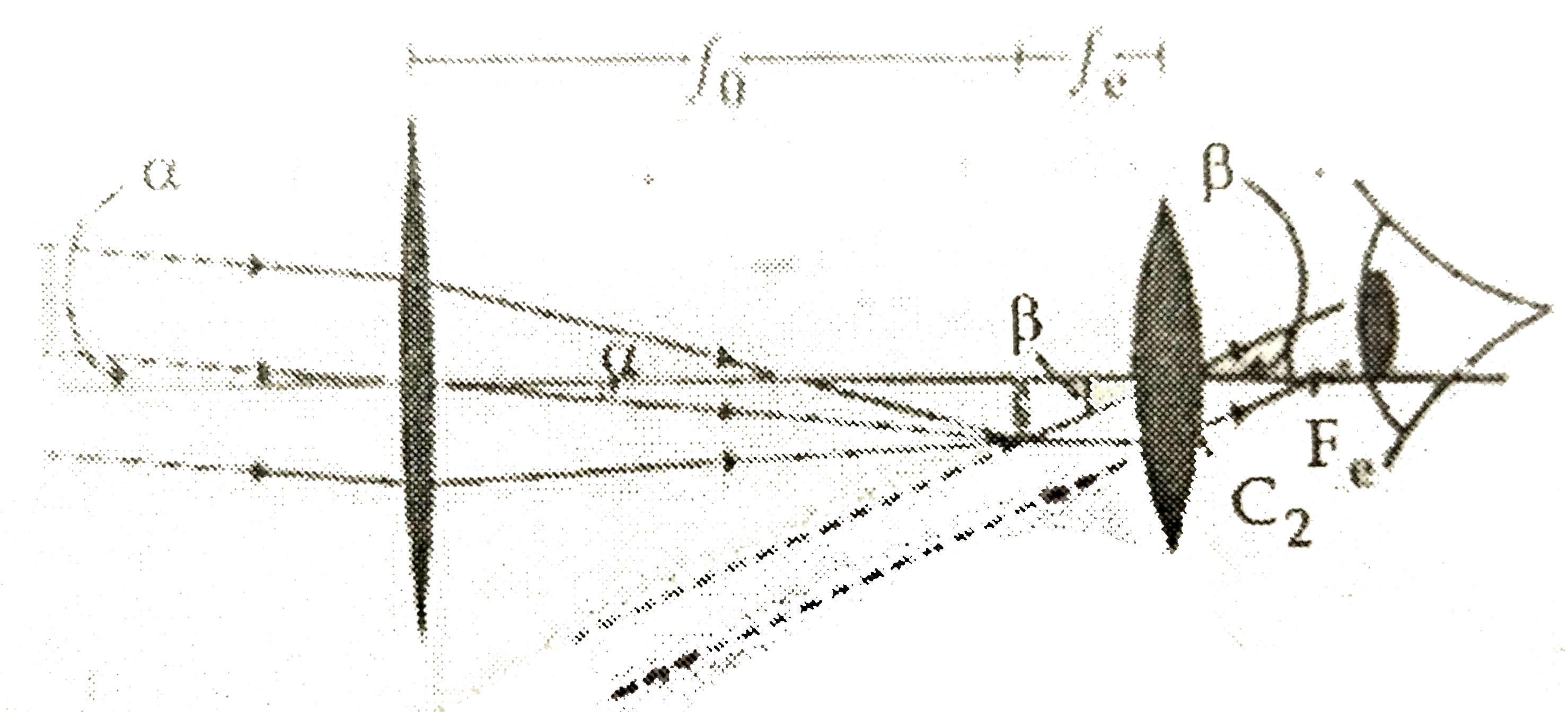(i) A giant refracting telescope at an observatory has an objective lens of focal length 15 m . If an eyepiece of focal length 1.0 cm is used, what is angular magnification of the telescope ?
(ii) If this telescope is used to view the moon, what is the diameter of the image of the moon formed by the objective lens ? the diameter of the moon is 3.48×106m, and the radius of lunar orbit is 3.8×108m.
Angular magnification
=−f0fe(1+feD)
=−15001(1+125)
=−1560

Negative sign indicates that the image is inverted.
Diameter of the image of the moon formed by the objective lens=d
tanα≈alph=diameter of the moonradius of the orbit=df0=3.42×1063.8×108=d15⇒d=0.135m
Topper's Solved these Questions
- XII BOARDSBOOK - XII BOARDS PREVIOUS YEARCHAPTER - XII BOARDSEXERCISE - SET-II
35 Videos
- XII BOARDSBOOK - XII BOARDS PREVIOUS YEARCHAPTER - XII BOARDSEXERCISE - SET-III
25 Videos
- XII BOARDSBOOK - XII BOARDS PREVIOUS YEARCHAPTER - XII BOARDSEXERCISE - SET III
9 Videos
- SAMPLE PAPER 2019BOOK - XII BOARDS PREVIOUS YEARCHAPTER - SAMPLE PAPER 2019EXERCISE - SECTION D
6 Videos
Similar Questions
(a) A giant refracting telescope at an observatory has an objective lens of focal length 15 m. If an eyepiece of focal length 1.0 cm is used, what is the angular magnification of the telescope?
(b) If this telescope is used to view the moon, what is the diameter of the image of the moon formed by the objective lens? The diameter of the moon is 3.48×106m, and the radius of lunar orbit is 3.8×108m.
View Solution(a) A giant refracting telescope at an observatory has an objective lens of focal length 15 m. If an eyepiece of focal length 1.0 cm is used, what is the angular magnification of the telescope?
(b) If this telescope is used to view the Moon, what is the diameter of the image of the Moon formed by the objective lens? The diameter of the Moon is 3.48×106m and the radius of lunar orbit is 3.8×106m.
View Solution
Knowledge Check
A giant telescope in an observatory has an objective of focal length 19 m and an eye-piece of focal length 1.0cm. In normal adjustment, the telescope is used to view the moon. What is the diameter of the image of the moon formed by the objective? The diameter of the moon is 3.5×106m. and the radius of the lunar orbit round the earth is 3.8×108m.
A10cmB12.5cmC15cmD17.5cmAn astronomical refractive telescope has an objective of focal length 20m and an eyepiece of focal length 2cm.
AThe length of the telescope tube is 20.02m.BThe magnification is 1000.CThe image formed is inverted.DAn objective of a larger aperture will increase the brightness and reduce chromatic aberration of the image.
A giant refracting telescope at an observatory has an objective lens of focal length15cm.If an eye piece of focal length 1.0cm is used What is the angular magnification of the telescope ?
View Solution(i) A giant refracting telescope at an observatory has an objective lens of focal length 15 m . If an eyepiece of focal length 1.0 cm is used, what is angular magnification of the telescope ?
(ii) If this telescope is used to view the moon, what is the diameter of the image of the moon formed by the objective lens ? the diameter of the moon is 3.48×106m, and the radius of lunar orbit is 3.8×108m.
View SolutionA gaint refrecting telescope at an observatory has an objective lens of focal length 15m. If an eye piece lens of focal length 1cm is used, find the angular magnification of the telescope.
If this telescope is used to view the moon, what is the diameter of image of moon formed by objective lens ? The diameter of the moon is 3.42×106m and radius of lunar orbit is 3.8×108m.
View SolutionDraw a labelled ray diagram of an astronomical telescope in the near point adjustment position. A giant refracting telescope at an observatory has an objective lens of focal length 15 m and an eyepiece of focal length 1.0 cm. If this telescope is used to view the Moon, find the diameter of the image of the Moon formed by the objective lens. The diameter of the Moon is 3.48×106m, and the radius of lunar orbit is 3.48×108m
View SolutionA giant refracting telescope at an observatory has an objective lens of focal length15cm.If an eye piece of focal length 1.0cm is used What is the angular magnification of the telescope ?
View Solution(a) Draw the ray diagram of an astronomical telescope when the final images is formed at infinity. Write the expression for the resolving power of the telescope.
(b) An astronomical telescope has an objective lens of focal length 20m and eyepiece of focal length 1 cm.
(i) Find the angular magnification of the telescope.
(ii) If this telescope is used to view the Moon, find the diameter of the image formed by the objective lens. Given the diameter of the Moon is 3.5×106m and the radius of lunar orbit is 3.8×108m.
View Solution
